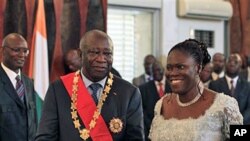A special adviser to Ivoirian President Laurent Gbagbo told VOA the international community, including the United Nations, is using targeted sanctions or restrictions to “blackmail” Ivory Coast amid the ongoing political crisis in the West African nation.
Ambassador Yao Gnamien maintains that dialogue between the rival parties, mediated by an “unbiased party,” is the only solution to resolving the country’s political impasse.
“If the international community wants to bring peace to our country, they have to listen to everybody, to listen to President Gbagbo, to listen to his opponent, and then they can sit together and find a solution for our political crisis,” said Ambassador Gnamien.
“The international community does not want to see, for one second, that we are a sovereign state with our constitution, (and) with our laws, and they think that what the U.N. says is the law of our country. It is not true. The U.N. is not above our county, (and) the international community is not above our country.’
His comments came after the Obama administration announced travel sanctions against Mr. Gbagbo and his close associates. The sanctions are aimed at putting more pressure on the Ivorian leader to step down and hand over power to former Prime Minister Alassane Ouattara.
Mr. Ouattara is the internationally-recognized winner of the 28th November presidential run-off vote, which was described by election observers as free and fair.
But, Ambassador Gnamien said there is no law on earth that, in his words, supersedes that of Ivory Coast’s constitution.
“The day the African and the (international community) will come to Cote d’Ivoire to listen to both parties and to make a decision, we will say that they want peace in our country,” said Ambassador Gnamien.
“(But,) as much as they sit in their countries and they (don’t) want to appreciate what is going on in our country, we think that it is a kind of interference in the Ivoirian internal affairs because an election is an internal affair.”
The United States imposed travel restrictions on Mr. Gbagbo and members of his family, including his wife, and other associates, who are said to be supporting policies that "undermine the democratic process" in Ivory Coast.
The action means that any members of Mr. Gbagbo’s inner circle who hold U.S. visas will have them revoked and that others seeking to travel to the United States will be denied visas.
The State Department said the action applies initially to dozens of people and that the list will be expanded as the situation warrants. The move comes a day after the European Union announced a similar visa ban and an asset freeze on the Ivorian leader and his wife.









